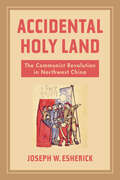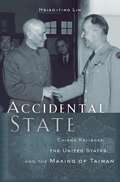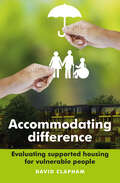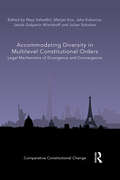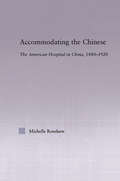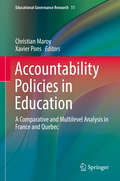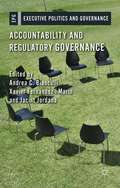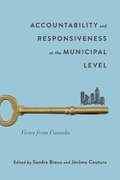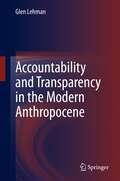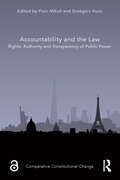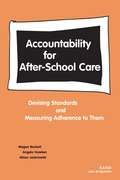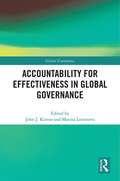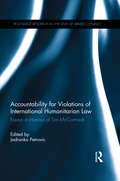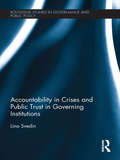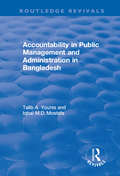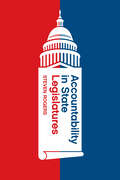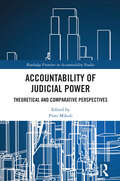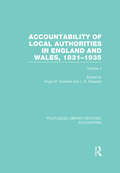- Table View
- List View
Accidental Holy Land: The Communist Revolution in Northwest China
by Joseph W. EsherickA free open access ebook is available upon publication. Learn more at www.luminosoa.org. Yan'an is China's "revolutionary holy land," the heart of Mao Zedong's Communist movement from 1937 to 1947. Based on thirty years of archival and documentary research and numerous field trips to the region, Joseph W. Esherick's book examines the origins of the Communist revolution in Northwest China, from the political, social, and demographic changes of the Qing dynasty (1644–1911), to the intellectual ferment of the early Republic, the guerrilla movement of the 1930s, and the replacement of the local revolutionary leadership after Mao and the Center arrived in 1935. In Accidental Holy Land, Esherick compels us to consider the Chinese Revolution not as some inevitable peasant response to poverty and oppression, but as the contingent product of local, national, and international events in a constantly changing milieu.
Accidental Nuclear War: Proceedings of the Eighteenth Pugwash Workshop on Nuclear Forces
by Derek Paul Michael D. Intriligator Paul SmokerThis book constitutes the Proceedings of a meeting held in Pugwash, Nova Scotia, 18-20 July 1989, which was the eighteenth in a series of Workshops on Nuclear Forces held in the framework of the Pugwash Conferences on Science and World Affairs. This particular series of Workshops was initiated in January 1980, that is, immediately after the NATO double-track decision of December 1979 that in the short run led to the deployment in Europe of new US nuclear-armed missiles – ground launched cruise missiles and medium-range ballistic missiles (Pershing II) – but that was also instrumental in setting into motion the process that led to the total elimination of all US and Soviet ground-based missiles having ranges from 500 to 5500km.
Accidental Presidents: Eight Men Who Changed America
by Jared CohenThe strength and prestige of the American presidency has waxed and waned since George Washington. Accidental Presidents looks at eight men who came to the office without being elected to it. It demonstrates how the character of the man in that powerful seat affects the nation and world. <P><P>Eight men have succeeded to the presidency when the incumbent died in office. In one way or another they vastly changed our history. Only Theodore Roosevelt would have been elected in his own right. Only TR, Truman, Coolidge, and LBJ were re-elected. John Tyler succeeded William Henry Harrison who died 30 days into his term. He was kicked out of his party and became the first president threatened with impeachment. Millard Fillmore succeeded esteemed General Zachary Taylor. He immediately sacked the entire cabinet and delayed an inevitable Civil War by standing with Henry Clay’s compromise of 1850. Andrew Johnson, who succeeded our greatest president, sided with remnants of the Confederacy in Reconstruction. Chester Arthur, the embodiment of the spoils system, was so reviled as James Garfield’s successor that he had to defend himself against plotting Garfield’s assassination; but he reformed the civil service. Theodore Roosevelt broke up the trusts. Calvin Coolidge silently cooled down the Harding scandals and preserved the White House for the Republican Herbert Hoover and the Great Depression. Truman surprised everybody when he succeeded the great FDR and proved an able and accomplished president. Lyndon B. Johnson was named to deliver Texas electorally. He led the nation forward on Civil Rights but failed on Vietnam. <P><P> Accidental Presidents adds immeasurably to our understanding of the power and limits of the American presidency in critical times. <P><b>A New York Times Bestseller</b>
Accidental State
by Hsiao-Ting LinDefeated by Mao Zedong, Chiang Kai-shek's Nationalists fled to Taiwan to establish a rival state, thereby creating the Two Chinas dilemma that vexes international diplomacy to this day. Hsiao-ting Lin challenges this conventional narrative, showing the many ways the ad hoc creation of this not fully sovereign state was accidental and serendipitous.
Accommodating Difference: Evaluating Supported Housing for Vulnerable People
by David ClaphamFor vulnerable older, disabled or homeless people who need accommodation and support, many different forms of housing have developed – whether hostels, group homes, extra-care housing or retirement villages. But do these settings effectively improve the well-being of those who live in them? This important book explores the impact of different forms of policy and practice on the lives of vulnerable people, arguing for a flexible policy approach that places people in control of their own lives. It puts forward an original evaluation framework and applies this to case studies of provision in Britain and Sweden – two countries with long and differing experiences – to raise interesting and important issues for the future. The book will be a valuable resource for those working in and devising policy for supported housing as well as students on urban studies and planning courses and those studying health and social care subjects who wish to better understand the nature of supported housing.
Accommodating Diversity in Multilevel Constitutional Orders: Legal Mechanisms of Divergence and Convergence (Comparative Constitutional Change)
by Marjan Kos Jaka Kukavica Julian Scholtes Jakob Gašperin Wischhoff Maja SahadžicThis book offers insights into the legal mechanisms that are adopted in multilevel constitutional orders to accommodate the tension between contrasting interests of diversity and unity and the converging or diverging effects they may have on the functioning of a multilevel constitutional order. It does so by targeting mainly the European experience but also drawing insights from other jurisdictions. The volume draws on a well-rounded theoretical framework that allows a comprehensive discussion of the dialectics in multi-level systems.) It focuses on two of the most relevant areas of constitutional law, namely the setup of supranational institutions and the protection of fundamental human rights. Finally, the work presents a fresh legal take on the unity-diversity dichotomy. This collection is ideal for academics working in the fields of constitutional law, international law, federal theory, institutional design, management and accommodation of diversity, and protection of fundamental rights. Political scientists will also find the discussions very relevant as a foundation for further research in their field. Policymakers involved in constitutional engineering will be interested, as mechanisms of accommodation, convergence, and divergence are increasingly looked at as devices for managing multilevel polities.
Accommodating Rising Powers
by Paul T. V.As the world enters the third decade of the twenty-first century, far-reaching changes are likely to occur. China, Russia, India, and Brazil, and perhaps others, are likely to emerge as contenders for global leadership roles. War as a system-changing mechanism is unimaginable, given that it would escalate into nuclear conflict and the destruction of the planet. It is therefore essential that policymakers in established as well as rising states devise strategies to allow transitions without resorting to war, but dominant theories of International Relations contend that major changes in the system are generally possible only through violent conflict. This volume asks whether peaceful accommodation of rising powers is possible in the changed international context, especially against the backdrop of intensified globalization. With the aid of historic cases, it argues that peaceful change is possible through effective long-term strategies on the part of both status quo and rising powers.
Accommodating the Chinese: The American Hospital in China, 1880-1920 (East Asia: History, Politics, Sociology and Culture)
by Michelle Campbell RenshawThis in-depth comparative study demonstrates that the hospital established in China - its planning and architecture, financing, and all aspects of day-to-day operation - differed from its counterpart at home. These differences were never due to a single, or even dominant cause. They were a result of a complex process involving accommodation, appreciation, negotiation, opportunism and pragmatism.
Accompanying: Pathways to Social Change
by Staughton LyndTo better understand the impact of social movements in recent years, this analysis distinguishes strategies of social change into two parts: organizing, which is characteristic of the 1960s movement in the United States, and accompaniment, which was articulated by Archbishop Óscar Romero of El Salvador. Both are valuable tools for understanding and promoting social movements; in accompaniment, the promoter of social change and his or her oppressed colleague view themselves as two experts, each bringing indispensable experience to a shared project. Together, as equals, they seek to create what the Zapatistas call "another world." The author applies the distinction between accompaniment and organizing to five social movements in which he has taken part: the labor and civil rights movements, the antiwar movement, prisoner insurgencies, and the movement sparked by Occupy Wall Street. Also included are the experiences of the author's wife Alice Lynd, a partner in these efforts, who has been a draft counselor and advocate for prisoners in maximum-security confinement.
Accountability Policies in Education: A Comparative and Multilevel Analysis in France and Quebec (Educational Governance Research #11)
by Christian Maroy Xavier PonsThis book addresses current changes of education policies in a context of globalisation. It does so by focusing on the implementation of performance-based accountability policies in France and in Quebec (Canada). It questions the trajectory of these policies, their mediations and their instrumentation in various territories and schools through a theoretical framework which combines a North American neo-institutionalist approach with the perspective of the French sociologie de l’action publique. The book extends the current international literature on English-speaking experiences of hard accountability to research on “soft” accountability policies and proposes a deep investigation in two highly contrasted education systems. This investigation is multilevel and has led to field research both in schools, in intermediate authorities, and in central administrations for three years. The research presented in the book addresses the international literature on accountability in public administration and in education, the current transformations of governance in education, as well as the forms taken by the globalisation of education policies in countries differently exposed to international influences. The comparison highlights a convergent neo-statist trajectory of the performance-based accountability policy in the two countries, various forms of governance by results enacted at the local and meso level, and more intense impacts of these policies on schools and teacher’s practices in Quebec than in France.
Accountability Reconsidered: Voters, Interests, and Information in US Policymaking
by Brandice Canes-Wrone Charles M. Cameron Sanford C. Gordon Gregory A. HuberThe last two decades have witnessed a substantial change in the media environment, growing polarization of the two dominant parties, and increasing inequality of wealth and income. These profound changes necessitate updating our understanding of political accountability. Accountability Reconsidered examines how political accountability functions in the US today given the dramatic changes in voting behavior, media, congressional dynamics, and relations between branches. With particular attention to policymaking, this volume uses original research to analyze micro-foundations of voter behavior, examining its implications for incentives and offering insight into the accountability relationships among voters, interest groups, legislators, and government bureaucracy. Combining contributions from leading experts who write about the political system synoptically with those who focus on specific elements, Accountability Reconsidered brings together distinct perspectives to focus on the effect of the informational environment on government officials, bridging up-to-date knowledge about accountability mechanisms with our overall understanding of political accountability.
Accountability and Regulatory Governance
by Andrea C. Bianculli Xavier Fern�ndez-i-Mar�n Jacint JordanaThis collection improves our understanding of the problems associated to accountability in regulatory governance, focusing on audiences, controls and responsibilities in the politics of regulation and through a systematic exploration of the various mechanisms through which accountability in regulatory governance
Accountability and Responsiveness at the Municipal Level: Views from Canada (McGill-Queen's Studies in Urban Governance #9)
by Sandra Breux Jérôme CoutureIn Canada, the quality of municipal democracy has been questioned due to three crucial factors. First, voter turnout tends to be significantly lower for municipal elections than it is for other levels of government. Second, the re-election rate of incumbent candidates is higher compared to provincial, territorial, and federal elections. Third, corruption and other scandals have tarnished the image of local democracy. Are cities sufficiently capable of responding to crises and representing the interests of their residents? Accountability and Responsiveness at the Municipal Level addresses these issues through qualitative and quantitative analysis, focusing on some of the most important characteristics of the Canadian municipal scene, including the contexts of partisanship and non-partisanship, the careers and daily work of municipal officials, and multilevel governance. This volume also assists directly in the collection and dissemination of data about cities as there is currently no centralized system for capturing and organizing electoral statistics at the municipal level. Municipal democracy in Canada suffers from a representation deficit. Accountability and Responsiveness at the Municipal Level is an important first step in building high-quality comparative information on the politics of Canada’s cities.
Accountability and Transparency in the Modern Anthropocene
by Glen LehmanThe book is about accountability processes and how they contribute solutions to our current environmental and global political problems. This book is different to other literature in this field. This is so because the dominant accountability discourse is shaped by what is defined as a neoliberal business case for social and environmental reform. This book assumes a nirvana stance within globalisation where all citizens operate within the parameters of the free market and will recover from adverse economic and political damage. Further this book uses neoliberalism and free-market reforms aims as examples to implement efficient management technologies and create more competitive pressures. Central to the argument of the book are perspectives on authenticity, expressivism and interpretivism which are found to provide a radical reworking of our understanding of being in the world. These frameworks offer a starting point for rethinking the way individuals, businesses and communities ought to be dealing politically with accountability and ecological crises. The argument builds to an accountability perspective that utilises work from expressivism, interpretivism, classical liberalism and postmodern theory. The theoretical quest undertaken in this book is to develop connections between accountability, democratic, ethical and ecological perspectives.
Accountability and the Law: Rights, Authority and Transparency of Public Power (Comparative Constitutional Change)
by Piotr Mikuli; Grzegorz KucaThis book discusses contemporary accountability and transparency mechanisms by presenting a selection of case studies. The authors deal with various problems connected to controlling public institutions and incumbents’ responsibility in state bodies. The work is divided into three parts. Part I: Law examines the institutional and objective approach. Part II: Fairness and Rights considers the subject approach, referring to a recipient of rights. Part III: Authority looks at the functional approach, referring to the executors of law. Providing insights into increasing understanding of various concepts, principles, and institutions characteristic of the modern state, the book makes a valuable contribution to the area of comparative constitutional change. It will be a valuable resource for academics, researchers, and policy-makers working in the areas of constitutional law and politics.
Accountability and the Law: Rights, Authority and Transparency of Public Power (ISSN)
by Piotr Mikuli Grzegorz KucaThis book discusses contemporary accountability and transparency mechanisms by presenting a selection of case studies.The authors deal with various problems connected to controlling public institutions and incumbents’ responsibility in state bodies. The work is divided into three parts. Part I: Law examines the institutional and objective approach. Part II: Fairness and Rights considers the subject approach, referring to a recipient of rights. Part III: Authority looks at the functional approach, referring to the executors of law. Providing insights into increasing understanding of various concepts, principles, and institutions characteristic of the modern state, the book makes a valuable contribution to the area of comparative constitutional change.It will be a valuable resource for academics, researchers, and policy-makers working in the areas of constitutional law and politics.
Accountability for After-School Care
by Alison Jacknowitz Angela Hawken Megan K. BeckettIncreasing numbers of children are participating in after-school programs, and with more federal and state funding the number of such programs is likely to grow. This growth has been occurring, however, with little guidance as to what program features or practices might be most helpful in nurturing the educational achievement, emotional development, and health of the children involved. This book helps fill that need for guidance by offering a set of 18 model practices against which after-school programs can be evaluated. The authors provide ways to score adherence to the criteria, from excellent to inadequate; survey forms for collecting the information to assign these grades; and an illustrative application of their approach to a set of real-world after-school programs.
Accountability for Effectiveness in Global Governance (Global Governance)
by John Kirton Marina LarionovaThe global community confronts a comprehensive and interconnected array of compelling economic, development and security challenges which require effective global governance. At the centre of world governance stand the new plurilateral summit institutions; the G8 and G20, and UN summits on subjects such as sustainable development and climate change. Many observers and participants regard the performance of these summits as inadequate and doubt their ability to cope with increasingly complex and numerous global challenges. This book critically examines how effectively central global institutions comply with their commitments and how their effectiveness can be improved through accountability measures designed to raise compliance and deliver better results. Expert contributors assess compliance and accountability at the key global institutions to provide an important resource for policymakers and scholars in political science, governance and accountability. For additional information and data relating to the book, please visit: http://www.g7g20.utoronto.ca/accountability/
Accountability for Violations of International Humanitarian Law: Essays in Honour of Tim McCormack (Routledge Research in the Law of Armed Conflict)
by Jadranka PetrovicInternational criminal adjudication, together with the prosecution and appropriate punishment of offenders at a national level, remains the most effective means of enforcing International Humanitarian Law. This book considers the various issues emanating from present-day breaches of norms of International Humanitarian Law (IHL) and the question of how impunity for such breaches can be tackled. Honouring the work of Timothy McCormack, Professor of International Law at the University of Melbourne and a world renowned expert on IHL and International Criminal Law, contributors of the book explore the interplay between the rules governing accountability for violations of IHL and other areas of law that impact the prosecution of war crimes, including international criminal law, human rights law, arms control law, constitutional law and national criminal law. In providing a contemporary consideration of the various issues emerging from present-day breaches of norms of IHL, especially in light of growing interest in ‘fragmentation’ and ‘normative pluralism’, this book will be of great use and interest to students and researchers in public international law, international law, and conflict studies.
Accountability in Crises and Public Trust in Governing Institutions (Routledge Studies in Governance and Public Policy)
by Lina SvedinThis book examines how efforts to exert accountability in crises affect public trust in governing institutions. Using Sweden as the case study, this book provides a framework to analyse accountability in crises and looks at how this affects trust in government. Crises test the fabric of governing institutions. Threatening core societal values, they force elected officials and public servants to make consequential decisions under pressure and uncertainty. Public trust in governing institutions is intrinsically linked to the ability to hold decision-makers accountable for the crucial decisions they make. The book presents empirical evidence from examination of the general bases for accountability in public administration, and at the accountability mechanisms of specific administrative systems, before focusing on longer term policy changes. The author finds that within the complex web of bureaucratic and political moves democratic processes have been undermined across time contributing to misplaced and declining trust in governing institutions. Accountability in Crises and Public Trust in Governing Institutions will be of interest to students, scholars and practitioners of public policy, political leadership and governance.
Accountability in Public Management and Administration in Bangladesh
by Talib A. Younis Iqbal Md. MostafaThis title was first published in 2000: This timely volume makes a valuable contribution to our understanding of the issues faced by developing countries embarking on the path of democracy and economic development. Accountability in public management and administration is an essential element in the decision making process. It provides a comprehensive study of public institutions and their management in a developing context.
Accountability in Public Policy Partnerships
by Julia SteetsA PDF version of this book is available for free in open access via the OAPEN Library platform, www. oapen. org . This book presents a new model of accountability which ensures that public-private partnerships don't erode public accountability. It defines concrete accountability standards for different types of partnerships.
Accountability in State Legislatures (Chicago Studies in American Politics)
by Steven RogersA troubling portrait of democracy in US state legislatures. State legislatures hold tremendous authority over key facets of our lives, ranging from healthcare to marriage to immigration policy. In theory, elections create incentives for state legislators to produce good policies. But do they? Drawing on wide-ranging quantitative and qualitative evidence, Steven Rogers offers the most comprehensive assessment of this question to date, testing different potential mechanisms of accountability. His findings are sobering: almost ninety percent of American voters do not know who their state legislator is; over one-third of incumbent legislators run unchallenged in both primary and general elections; and election outcomes have little relationship with legislators’ own behavior. Rogers’s analysis of state legislatures highlights the costs of our highly nationalized politics, challenging theories of democratic accountability and providing a troubling picture of democracy in the states.
Accountability of Judicial Power: Theoretical and Comparative Perspectives (Routledge Frontiers in Accountability Studies)
by Piotr MikuliThis book brings together a group of international scholars to discuss theoretical and comparative considerations of judicial accountability. Accountability of the judiciary is an essential element in a democratic state ruled by law. Its design must take into account the need to ensure both the legitimacy of the judiciary and its independence. The work discusses accountability in the light of recent research, including studies on the crisis of the rule of law in the contemporary world. The book adopts a broad approach to accountability, which has various facets, referring both to the courts, that is the organisational element of the judicial branch of government, and to judges, its individual dimension. It is divided into four parts: the first deals with the essence of the concept of accountability of the judiciary; the second discusses the emerging standards relating primarily to the individual accountability of judges; and the third discusses the position of constitutional judges through the lens of accountability. The fourth and final part provides a detailed consideration of the specific accountability mechanisms. The book will be a valuable resource for academics, researchers, and policymakers working in the areas of constitutional law and politics, and accountability studies.
Accountability of Local Authorities in England and Wales, 1831-1935 Volume 1 (Routledge Library Editions: Accounting)
by Hugh M. Coombs J. R. EdwardsThese books make available material relating to the statutory regulations covering the degree of accountability required from local authorities during the period 1834-1936. The bulk of historical accounting research has focused on the development of financial accounting although in recent years the development of management accounting has attracted more interest. In both these areas, it has been the accounting practices of the private sector which have received more attention, central government in the Middle Ages some attention, and local government accounting very little. These volumes redress this imbalance in historical investigation, both to provide a comparative basis for work on the private sector and to provide an historical perspective for the system of local government accounting currently in use.
